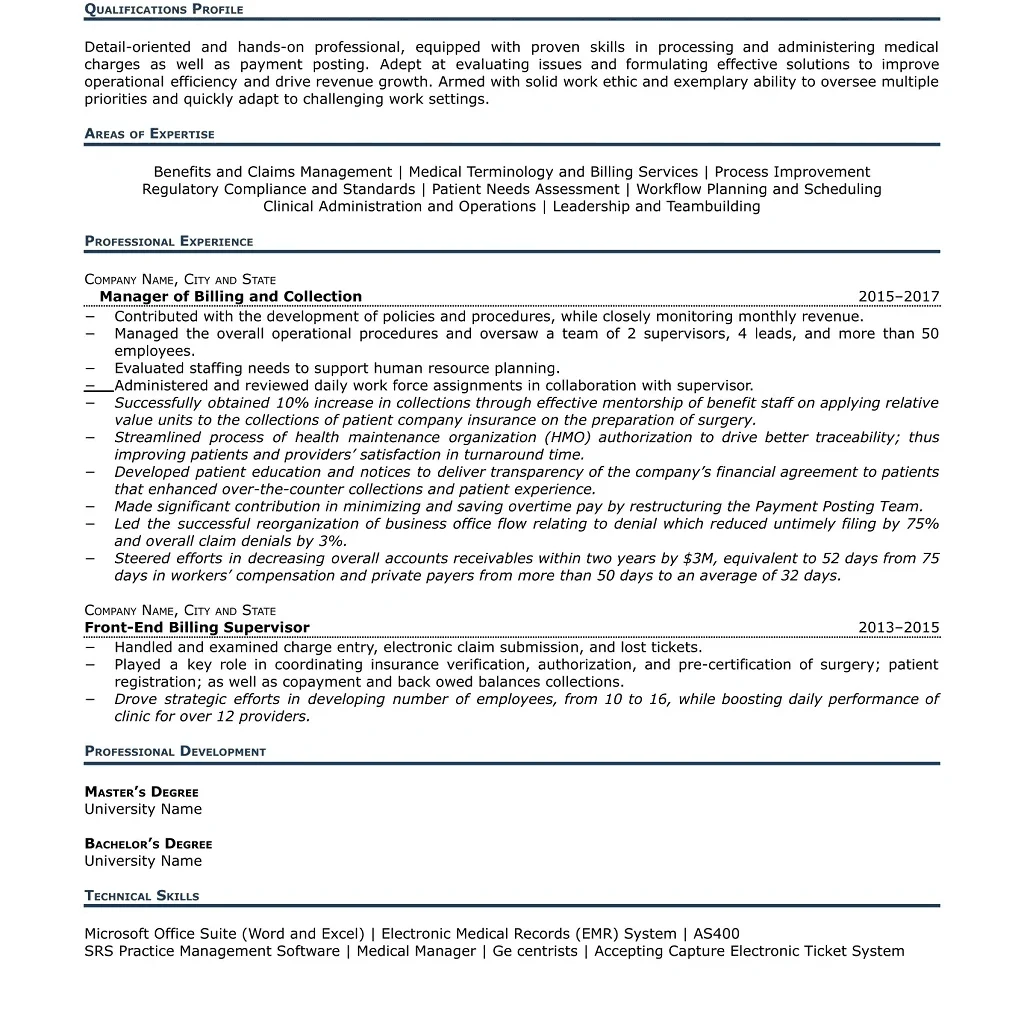A well-crafted medical coder resume plays an integral role in unlocking opportunities for you in the healthcare industry. This job search tool serves as your professional calling card that markets your qualifications, experience, and potential. With hiring managers reviewing countless resumes, it’s therefore essential to create one that stands out and makes a lasting impression.
Let’s explore how to build a resume that maximizes your strengths and increases your chances of landing your ideal medical coding job. Here’s everything you need to know about the dos and don’ts in writing a medical coder resume.

What is a Medical Coder Resume?
A medical coder resume is a document that provides hiring managers with a snapshot of your qualifications and experience in the medical coding field. Medical coding involves translating healthcare diagnoses, procedures, and services into standardized codes. Therefore, your resume should emphasize the ability to accurately process these codes in compliance with regulatory standards, while at the same time improving the efficiency of medical billing and recordkeeping.
In addition to coding proficiency, a strong medical coder resume also sheds light on your expertise in managing medical records and using electronic health records (EHR) systems. This document should reflect both your technical knowledge of the coding system and your ability to handle the administrative aspects of a medical coder job.
Essential Sections to Include in Your Medical Coder Resume
When crafting your medical coder resume, it’s crucial to include specific sections that give hiring managers a clear understanding of your qualifications. These sections not only organize your information but also allow you to showcase your relevant skills and experience in the most impactful way.
1. Contact Information
Make your contact information easy to find at the top of your resume. Include your full name, phone number, email address, and a professional LinkedIn profile (if available). This ensures that hiring managers can easily reach out to you.
2. Professional Summary
Your professional summary is the first chance you have to grab the hiring manager’s attention. In just a few sentences, emphasize your experience as a certified professional coder, your expertise with coding systems, and your ability to manage medical records and EHR systems.
3. Skills Section
This section is where you showcase the relevant skills that are essential in a medical coding role. These might include:
- Proficiency with various coding systems
- Knowledge of medical terminology and health records EHR systems
- Ability to manage medical billing and streamline coding processes
- Attention to detail and strong organizational skills
- Familiarity with healthcare regulations and compliance standards
4. Work Experience
When detailing your work experience, use a reverse chronological format to list your most recent roles first. Put your achievements to the fore, using bullet points to highlight specific accomplishments, such as increasing coding accuracy or reducing claim rejections. For example:
- Reduced claim rejections by 15% by improving coding accuracy
- Processed over 100 medical records daily while adhering to industry standards
- Trained new coders on her software and medical billing procedures
5. Education and Certifications
List your educational background, including any degrees or certifications relevant to the medical coding field. Incorporate any certifications you hold, such as Certified Professional Coder (CPC), or any specialized training in medical coding systems.
6. Additional Sections
If applicable, include additional sections such as professional development courses, awards, or memberships in industry organizations like the American Academy of Professional Coders (AAPC). These will further speak of your commitment to professional growth and staying up-to-date with the latest in the medical coding field.

Step-by-Step Guide to Crafting a Winning Medical Coding Resume
Creating a strong medical coder resume takes time, but following a clear step-by-step process ensures that you effectively showcase your qualifications. Here’s a detailed, six-step guide to help you stand out to hiring managers.
1. Write a Concise and Engaging Professional Summary
The first step in crafting your medical coder resume is to write a professional summary that immediately captures the hiring manager’s attention. In this section, aim to highlight your core qualifications as a certified professional coder. Make sure to introduce yourself succinctly and make your case as the top candidate for the role.
2. Tailor Your Resume to the Job Description
Each medical coding position has its own set of requirements. Carefully read through the job description to identify the key skills and qualifications the employer is seeking. Don’t forget to customize your resume to align with the job posting.
3. Make Your Relevant Skills Shine
The skills section of your medical coding resume is where you can enumerate your specific qualifications and abilities. Focus on the relevant skills required for a medical coder job, including proficiency, including both technical and soft skills.
4. Showcase Your Work Experience Using Bullet Points
Your work experience section is a key part of your medical coder resume, and it’s essential to showcase measurable results. Instead of listing general duties, prioritize the achievements that speak of your impact in previous roles. For instance, you could include accomplishments such as:
- Processed over 150 medical records daily, ensuring accurate coding for billing purposes
- Reduced coding errors by 20% through improved attention to detail and training in HCPCS Level II
- Increased claim approval rates by streamlining coding processes and utilizing up-to-date CPT codes
5. Focus on Education and Certifications
In the education section, emphasize your formal qualifications and any certifications that are essential for a medical coder job. Include your degree (if applicable) and any relevant certifications. Additionally, mention any ongoing education or relevant coursework in medical terminology or coding systems.
6. Use a Clean, Easy-to-Read Format
Last but not least, your medical coding resume should be visually appealing and easy to navigate. Use a clean, professional layout with clear headings, bullet points, and concise sections. The key here is to ensure that your resume is easy to read while still including all the necessary information.
Medical Coding Resume Example
A strong medical coding resume leaves a lasting impression on hiring managers. Here’s an example that showcases how to effectively present your qualifications and experience in this field.

Common Medical Coding Resume Mistakes and How to Avoid Them
When crafting your medical coder resume, avoiding these common mistakes can significantly increase your chances of catching the attention of hiring managers and securing the job.
Neglecting to Customize Your Resume
One of the biggest mistakes job seekers make is using a generic resume for every application. Hence, align your skills, experience, and qualifications with the employer’s needs to increase your chances of standing out and catching the hiring manager’s attention.
Overloading with Jargon
While knowledge of medical terminology is a key skill, overloading your resume with technical jargon might confuse hiring managers who may not be familiar with every term. It’s important to strike a balance by incorporating the necessary terms but ensure that your medical coding resume remains clear and easy to understand.
Ignoring Formatting
An overcrowded or disorganized resume is difficult to navigate and may discourage hiring managers from reading it thoroughly. To avoid this, use a clean, professional format with clear headings, bullet points, and sections presented in reverse chronological order. This allows your most recent and relevant experience to stand.
Failing to Quantify Achievements
A resume filled only with job duties does not effectively showcase your accomplishments. Instead of listing generic tasks, focus on measurable outcomes such as increasing coding accuracy, reducing claim rejections, or streamlining medical billing processes. By using specific numbers and results, you provide concrete evidence of your impact, making your medical coding resume more compelling to hiring managers.
Omitting Relevant Certifications
Certifications are crucial for showcasing your expertise in medical coding. Failing to incorporate these certifications might make it appear as though you lack essential qualifications for the role. Be sure to list any relevant certifications or training to demonstrate your full range of qualifications for the medical coder position.

Achieve Success in Medical Coding with ResuMeds
Building the perfect medical coder resume doesn’t have to be a daunting task. By following the tips and guidelines outlined in this post, you can craft a professional resume that highlights your skills and experience in the most effective way possible.
If you’re still unsure about how to create the perfect medical coding resume, consider partnering with ResuMeds. We specialize in helping professionals craft medical resumes that stand out and get noticed by hiring managers. Our team of experts will ensure your resume reflects your expertise and give you the best chance of securing that all-important interview.
Let ResuMeds help you take your career to the next level!
